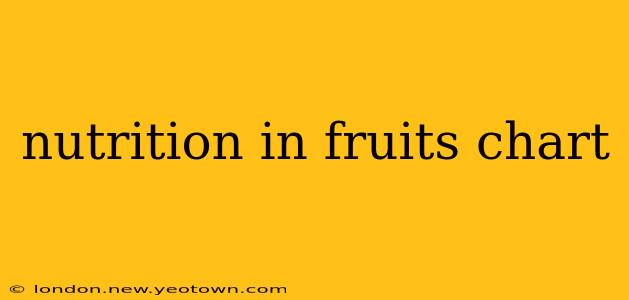Fruits—nature's candy! But beyond their sweet appeal lies a treasure trove of essential vitamins, minerals, and antioxidants crucial for a healthy and vibrant life. This isn't just a chart; it's a journey through the nutritional powerhouses found in your favorite fruits. We'll explore the nutritional benefits of various fruits, addressing common questions and debunking some myths along the way.
What are the main nutrients found in fruits?
Fruits are bursting with a diverse range of nutrients, varying depending on the type. However, some common nutritional stars include:
- Vitamins: Vitamin C (a potent antioxidant), Vitamin A (important for vision and immune function), various B vitamins (essential for energy metabolism), and Vitamin K (crucial for blood clotting).
- Minerals: Potassium (vital for heart health and blood pressure regulation), magnesium (involved in numerous bodily functions), and manganese (contributes to bone health and metabolism).
- Fiber: Fruits are excellent sources of both soluble and insoluble fiber, which aids digestion, regulates blood sugar, and promotes gut health.
- Antioxidants: These powerful compounds protect your cells from damage caused by free radicals, reducing the risk of chronic diseases. Examples include carotenoids (found in brightly colored fruits), flavonoids, and anthocyanins.
- Water: Fruits contain significant amounts of water, contributing to hydration and overall well-being.
What are the benefits of eating fruits daily?
Imagine this: a vibrant immune system, glowing skin, and consistent energy throughout your day. This isn't a fantasy—it's the reality of incorporating a daily dose of fruit into your diet. The benefits are numerous:
- Improved Digestion: The high fiber content in fruits promotes regular bowel movements and prevents constipation.
- Weight Management: The fiber and water in fruits help you feel full, reducing overall calorie intake.
- Reduced Risk of Chronic Diseases: The antioxidants in fruits combat oxidative stress, lowering the risk of heart disease, type 2 diabetes, and certain cancers.
- Boosted Immunity: Fruits are packed with vitamins and minerals that strengthen your immune system, making you less susceptible to infections.
- Healthy Skin: The vitamins and antioxidants contribute to healthy skin, reducing inflammation and promoting a youthful glow.
Which fruits are highest in Vitamin C?
Vitamin C is a superstar nutrient, bolstering your immune system and acting as a potent antioxidant. Some of the top Vitamin C contenders include:
- Acerola cherries: These tiny powerhouses are known for their exceptionally high Vitamin C content.
- Guava: This tropical fruit packs a serious Vitamin C punch.
- Kiwifruit: A small but mighty fruit, kiwifruit is a great source of Vitamin C.
- Oranges: A classic source of Vitamin C, oranges are readily available and easy to incorporate into your diet.
- Strawberries: These sweet berries also contribute significantly to your daily Vitamin C intake.
Which fruits are best for weight loss?
While no single fruit magically melts away pounds, certain fruits can contribute significantly to a weight-loss journey. These fruits are typically low in calories, high in fiber, and rich in water, promoting satiety and preventing overeating:
- Berries (strawberries, blueberries, raspberries): Low in calories and high in fiber, berries are a great snack option.
- Apples: The fiber in apples helps you feel full, while the water content contributes to hydration.
- Grapefruit: This citrus fruit is often associated with weight loss due to its potential to improve metabolism.
- Avocado: Although higher in calories than other fruits, avocados are rich in healthy fats that can promote satiety.
Are there any fruits I should avoid?
Most fruits are beneficial for health, but moderation is key. Some fruits are higher in sugar than others, and excessive consumption can lead to weight gain and other health issues. Be mindful of your portion sizes, especially with fruits like:
- Dried fruits: These are concentrated sources of sugar and calories.
- Fruit juices: Often lack the fiber found in whole fruits, leading to rapid sugar absorption.
This exploration only scratches the surface of the incredible nutritional diversity in the fruit kingdom. The best approach is to consume a wide variety of colorful fruits to reap the full spectrum of their health benefits. So, go ahead, embrace the deliciousness and nutritional power of fruits—your body will thank you!

